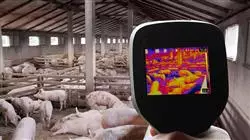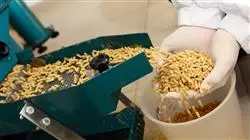University certificate
The world's largest faculty of veterinary medicine”
Introduction to the Program
Become one of the most demanded professionals of the moment: gain specialist knowledge in Veterinary Nutrition through this convenient online Professional master’s degree at TECH"

The Professional master’s degree in Veterinary Nutrition specializes professionals in one of the sectors of animal production the highest labor demand and need for specialization. It is a unique program given its level of specialization and the logical learning sequence in which the content is arranged, having been structured by industry experts into ten meticulously developed modules.
First, it establishes the fundamental principles of Veterinary Nutrition to later take a better approach to nutrition and feeding by species. In addition, it studies in depth the main raw materials used in the formulation of balanced feed, the characteristics, inclusion levels and quality parameters, since without quality in the basic components of the feed, there is no nutrition. An entire module is dedicated to the additives used in Ration Manufacturing. This segment is evolving year after year and includes important topics such as antibiotic-free production and the use of phytogenetic crops, which are currently the most topical issues.
The current world population is estimated to be 7.6 billion people and is expected to increase to 8.6 billion by 2030. Veterinary Nutrition is one of the disciplines being called upon to find ways in which to produce sufficient and economical protein, in an efficient and sustainable manner, to be able to feed this growing demand in the population.
In summary, this program is an ambitious, broad, structured and interwoven approach, covering everything from the fundamental and relevant principles of nutrition to food manufacturing. In addition, it specializes the student in the food manufacturing process with the latest innovations and the newest technology in the current market.
Join the elite, with this highly effective program and open new paths to help you advance in your professional career"
This Professional master’s degree in Veterinary Nutrition contains the most complete and up-to-date scientific program on the market. The most important features include:
- The latest technology in online teaching software
- A highly visual teaching system, supported by graphic and schematic contents that are easy to assimilate and understand
- Practical cases presented by practising experts
- State-of-the-art interactive video systems
- Teaching supported by telepractice
- Continuous updating and recycling systems
- Autonomous learning: full compatibility with other occupations
- Practical exercises for self-evaluation and learning verification
- Support groups and educational synergies: questions to the expert, debate and knowledge forums
- Communication with the teacher and individual reflection work
- Content that is accessible from any fixed or portable device with an Internet connection
- Banks of complementary documentation permanently available, even after completing the Professional Master's Degree
A Professional master’s degree that will enable you to work in all fields of Veterinary Nutrition with the competence of a high-level professional"
The teaching staff includes professionals from the field of Veterinary Nutrition, who contribute their experience to this program, as well as renowned specialists from leading societies and prestigious universities.
The multimedia content, developed with the latest educational technology, will provide the professional with situated and contextual learning, i.e., a simulated environment that will provide the necessary knowledge to train students for real-life situations.
This program is designed around Problem-Based Learning, whereby the professional must try to solve the different professional practice situations that arise throughout the program. To this end, the professional will be assisted by an innovative system of interactive videos made by leading and experienced food safety experts.
Learn from the experience of working professionals who are experts in Veterinary Nutrition"

With a methodological design based on proven teaching techniques, this Professional master’s degree in Veterinary Nutrition will take you through different teaching approaches to allow you to learn in a dynamic and effective way"
Why study at TECH?
TECH is the world’s largest online university. With an impressive catalog of more than 14,000 university programs available in 11 languages, it is positioned as a leader in employability, with a 99% job placement rate. In addition, it relies on an enormous faculty of more than 6,000 professors of the highest international renown.

Study at the world's largest online university and guarantee your professional success. The future starts at TECH”
The world’s best online university according to FORBES
The prestigious Forbes magazine, specialized in business and finance, has highlighted TECH as “the world's best online university” This is what they have recently stated in an article in their digital edition in which they echo the success story of this institution, “thanks to the academic offer it provides, the selection of its teaching staff, and an innovative learning method aimed at educating the professionals of the future”
A revolutionary study method, a cutting-edge faculty and a practical focus: the key to TECH's success.
The most complete study plans on the university scene
TECH offers the most complete study plans on the university scene, with syllabuses that cover fundamental concepts and, at the same time, the main scientific advances in their specific scientific areas. In addition, these programs are continuously being updated to guarantee students the academic vanguard and the most in-demand professional skills. In this way, the university's qualifications provide its graduates with a significant advantage to propel their careers to success.
TECH offers the most comprehensive and intensive study plans on the current university scene.
A world-class teaching staff
TECH's teaching staff is made up of more than 6,000 professors with the highest international recognition. Professors, researchers and top executives of multinational companies, including Isaiah Covington, performance coach of the Boston Celtics; Magda Romanska, principal investigator at Harvard MetaLAB; Ignacio Wistumba, chairman of the department of translational molecular pathology at MD Anderson Cancer Center; and D.W. Pine, creative director of TIME magazine, among others.
Internationally renowned experts, specialized in different branches of Health, Technology, Communication and Business, form part of the TECH faculty.
A unique learning method
TECH is the first university to use Relearning in all its programs. It is the best online learning methodology, accredited with international teaching quality certifications, provided by prestigious educational agencies. In addition, this disruptive educational model is complemented with the “Case Method”, thereby setting up a unique online teaching strategy. Innovative teaching resources are also implemented, including detailed videos, infographics and interactive summaries.
TECH combines Relearning and the Case Method in all its university programs to guarantee excellent theoretical and practical learning, studying whenever and wherever you want.
The world's largest online university
TECH is the world’s largest online university. We are the largest educational institution, with the best and widest online educational catalog, one hundred percent online and covering the vast majority of areas of knowledge. We offer a large selection of our own degrees and accredited online undergraduate and postgraduate degrees. In total, more than 14,000 university degrees, in eleven different languages, make us the largest educational largest in the world.
TECH has the world's most extensive catalog of academic and official programs, available in more than 11 languages.
Google Premier Partner
The American technology giant has awarded TECH the Google Google Premier Partner badge. This award, which is only available to 3% of the world's companies, highlights the efficient, flexible and tailored experience that this university provides to students. The recognition as a Google Premier Partner not only accredits the maximum rigor, performance and investment in TECH's digital infrastructures, but also places this university as one of the world's leading technology companies.
Google has positioned TECH in the top 3% of the world's most important technology companies by awarding it its Google Premier Partner badge.
The official online university of the NBA
TECH is the official online university of the NBA. Thanks to our agreement with the biggest league in basketball, we offer our students exclusive university programs, as well as a wide variety of educational resources focused on the business of the league and other areas of the sports industry. Each program is made up of a uniquely designed syllabus and features exceptional guest hosts: professionals with a distinguished sports background who will offer their expertise on the most relevant topics.
TECH has been selected by the NBA, the world's top basketball league, as its official online university.
The top-rated university by its students
Students have positioned TECH as the world's top-rated university on the main review websites, with a highest rating of 4.9 out of 5, obtained from more than 1,000 reviews. These results consolidate TECH as the benchmark university institution at an international level, reflecting the excellence and positive impact of its educational model.” reflecting the excellence and positive impact of its educational model.”
TECH is the world’s top-rated university by its students.
Leaders in employability
TECH has managed to become the leading university in employability. 99% of its students obtain jobs in the academic field they have studied, within one year of completing any of the university's programs. A similar number achieve immediate career enhancement. All this thanks to a study methodology that bases its effectiveness on the acquisition of practical skills, which are absolutely necessary for professional development.
99% of TECH graduates find a job within a year of completing their studies.
Master's in Veterinary Nutrition
.
Animal nutrition is a subject of great importance both for the approach to productive processes and for the guarantee of the health and welfare of the species. At TECH Global University we have created a program specialized in the study of intestinal health, covering from its functionality to its usefulness for animal production, in the case of poultry, pigs, ruminants and fish. During the 12 months that this program requires, students will study in depth the chemical composition of foods, their manufacture and the use of additives, and later, the digestibility and metabolism of vitamins, proteins and fats from these foods. This will allow him to design dietary programs, simple or complex, depending on the case, that meet the nutritional requirements of each species. Regarding animal production, the program offers contents related to fattening, reduction of environmental impact and growth promotion through the use of adjustments without the use of antibiotics. In addition, strategies for assuring fresh and refrigerated quality are presented. Thanks to these thematic axes, the veterinarian will be able to recognize the metabolic particularities and propose adequate diets that favor the correct absorption of nutrients.
Postgraduate course in Veterinary Nutrition
.
This postgraduate course at TECH enables professionals in this area to identify, analyze and determine the factors that affect the digestive performance and intestinal integrity of different animal species. This, in order to strengthen the theoretical and practical skills required for the planning of nutritional strategies oriented either to the protection of health or to the fulfilment of zootechnical objectives. From the mastery of the knowledge on food manufacturing processes and the respective handling of raw materials and machinery, it will be possible to develop the necessary skills to carry out quality controls and sampling of critical points in the industries dedicated to this activity. In this way, the future graduate of the Master's in Veterinary Nutrition will be able to carry out complete analyses and appropriate interventions, where special importance is given to the biochemical functioning of the digestive systems, in order to optimize the intake and metabolization of all types of nutrients.







